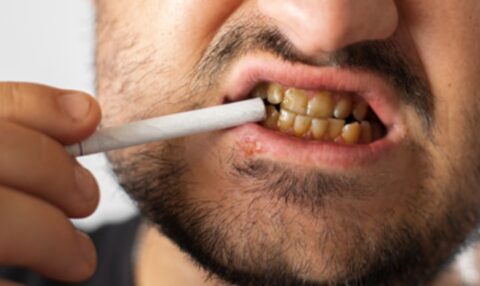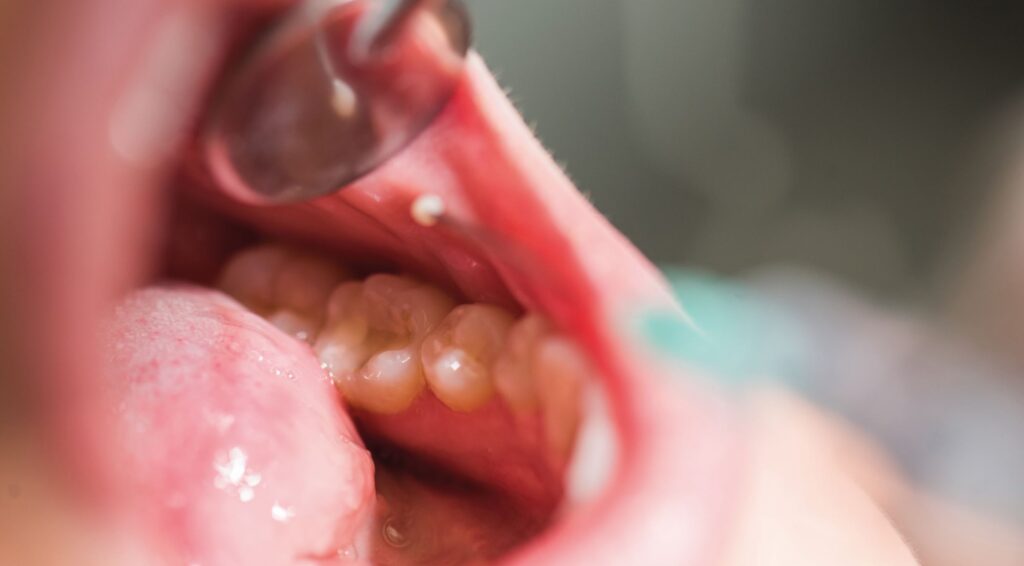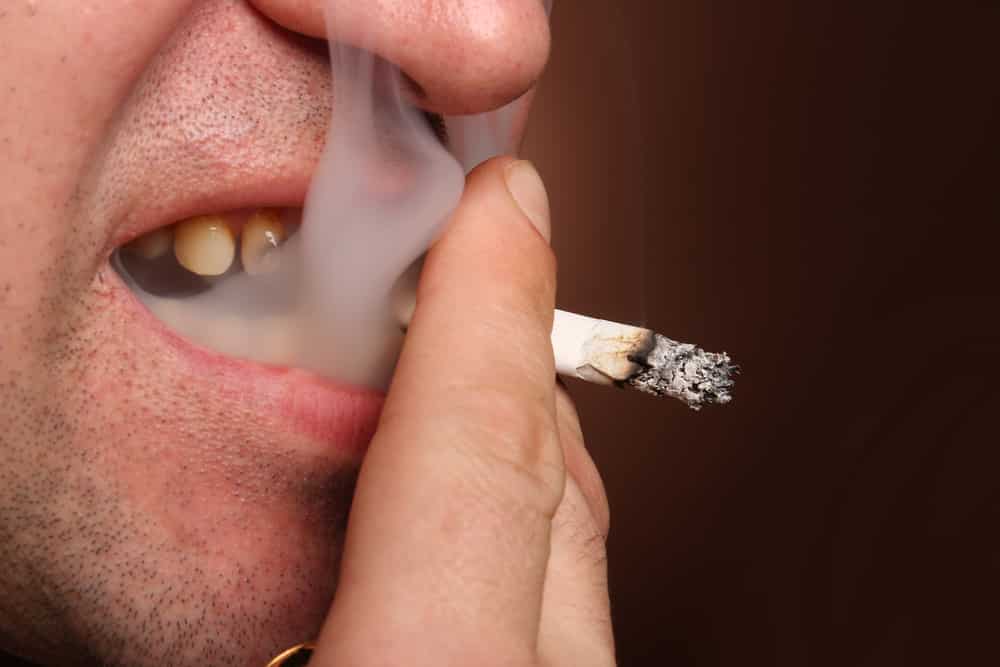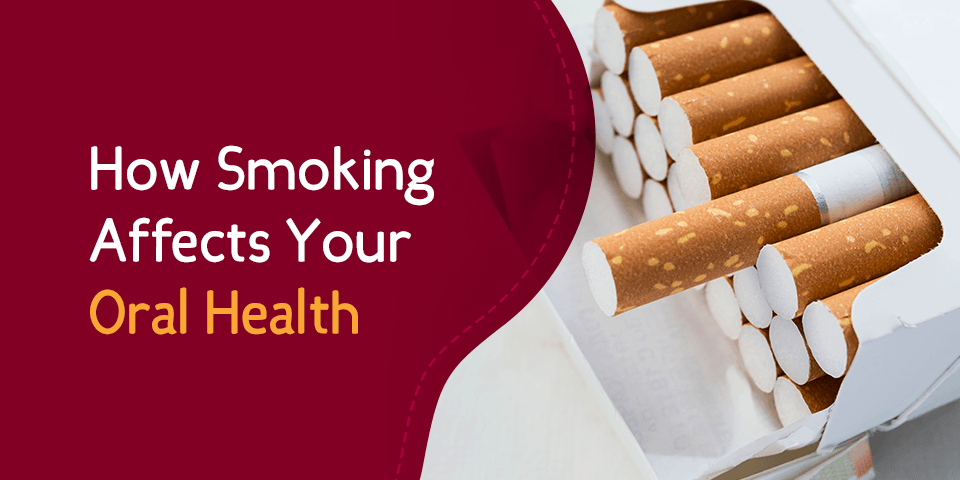Smokers are more likely to experience gum disease, tooth loss, issues following dental procedures and tooth extraction, and oral cancer. They don’t recover as effectively as non-smokers & therefore are more prone to infections.
Giving up smoking decreases oral cancer, lowers the likelihood of tumors in the mouth and gingivitis, and enhances the patient’s reaction to gum therapy.
It is crucial that smokers see their dentist on a frequent basis to maintain gum and tooth health and to have any indications of oral cancer detected.
In order to identify and address any dental health issues, it’s crucial for vapers to see a dentist on a regular basis. Be careful to let your dentist know if you vape.
Smoking and Tobacco Use Affect
Giving Up to Improve Oral Health
The good thing is that dental health can significantly improve when smoking and other tobacco usage are stopped.
By breaking these habits, you may restore blood flow to your gums, which lowers inflammation and lowers your chance of developing gum disease in the future.
As time passes, the chance of developing oral cancer lowers and dental stains might progressively disappear.
It should come as expected that tobacco usage may have detrimental consequences on one’s teeth, gums, and throat given how bad smoking is for your health.
Making routine trips to the dentist for an extensive cleaning and check-up guarantees that you will receive the best care possible. You might need to see the best doctor for dental in dwarka more regularly in order to treat tooth discoloration.
What Effects Does Smoking Have on Your Dental and Oral Health?

There is a lengthy and alarming list of the negative consequences of smoking on dental health. While some of the risks for smokers are obvious, several are highly concerning.
Discoloration & Staining: Tobacco has the potential to cause discoloration and taint teeth. According to a Centers for Disease Control and Prevention (CDC) research, tooth discolouration is thrice as common among smokers as in non-smokers.
Gum Conditions and Tooth Loss: Cigarettes accelerates the decay of teeth and raises the likelihood of developing gum disease. The Birmingham University research suggests that men who smoke have a 3.6 times greater chance of losing their teeth than people who do not smoke, corresponding to an NDTV story. On the other hand, the probability is 2.5 times higher for female smokers.

Danger of Oral Cancer: Cigarettes greatly increase the chance of developing oral cancer. According to Oral Health, one’s likelihood of developing oral cancer is 10 times higher in smokers than in non-smokers.
Surgical and medical procedures weakened: Because smoking impairs immunity, it takes longer for wounds from dental operations to heal. The WHO claims that because smoking impairs the immune system, smokers require longer recovery times following dental treatment.
Complications from Dental Steps: Treating smokers presents several difficulties for dentistry. Smoking can make dental operations more difficult, raise the possibility of problems, and lessen the efficacy of therapies like gum disease care and implant dentistry.
Effect on Orthodontic Therapies: Smoking can impede the intended tooth movement in patients receiving braces or orthodontic aligners, prolonging treatment periods and perhaps producing less favorable results.
What goes on within the oral cavity of a smoker?

A healthy mouth is necessary for proper digestion since it facilitates smooth speech and complete food chewing.
Of all, one of the best ways to boost confidence is with a beautiful smile. You might not be aware, though, of how smoking affects your teeth’s appearance and functionality, as well as how you eat. Are you aware, for instance, that:
- Tobacco frequently turns dental enamel yellow, even brown, discoloring your teeth & tongue.
- Your preferred foods and beverages become less enjoyable when you smoke because smoking impairs the ability of taste and smell.
- If you smoke cigarettes, dental cosmetic surgeries (such teeth whitening) could not be as successful or durable.
- Chronic foul breath is a side effect of smoking that can seriously undermine your self-esteem.
How smokers’ teeth become more seriously affected
There is no denying smoking’s strong addictive nature. All cigarettes and cigars include nicotine, which is the reason quitting is so difficult.
Because nicotine has a relaxing and energizing impact on many of those who smoke, it’s understandable that many are resistant to quitting.
However, becoming more knowledgeable about the harm tobacco causes in the mouth can inspire you to take action.
- There is less saliva produced in your mouth while you smoke. This alters the microbial mechanism that naturally removes germs that cause cavities in the mouth.
- The gums & the outer layer of your mouth may get irritated by the toxins in tobacco smoke.
- Gingivitis, or early gum disease, may appear gradually. Gums that are sore or sensitive and bleeding are warning signs.
- Your gums may separate from the enamel of your teeth to be a result of these problems, creating deep pockets that can harbor infection.
- Teeth might become loose due to the deterioration of the tissues and bone holding them in place. The oral surgeon or dentist who treats you may have to pluck them out or they might fall out.
- Your teeth that remain may be at risk of decay if you have missing teeth. Actually, compared to those who do not smoke, smokers have a three times higher chance of losing ALL of their teeth.
Intervention:
The only method to lower the chance of dying from serious oral and overall wellness issues is to stop smoking. According to research, after a smoker stops, their oral issues tend to recur.
Although addiction to cigarettes may make quitting tough, there are a number of ways that might help people kick the habit. Two categories of smoking cessation exist:
- Medicinal treatment: This covers both non-nicotine & substitute nicotine treatment. Nicotine gum, patches for the skin, nasal sprays, pills, and lozenges are some of the tools used in nicotine substitution therapy to lessen cravings and signs of withdrawal. These are free of any dangerous ingredients and only contain a small amount of nicotine. In the interim, varenicline, bupropion, & nortriptyline are only a few of the medications used in non-nicotine treatment to aid in smoking cessation.
- Behavioral treatment: When administered by qualified counselors, behavioral therapy has been shown to assist a number of smokers in giving up. These therapy sessions assist people become more determined to give up smoking and help them focus their minds on other tasks that help them resist the temptation to smoke.

Leave a Reply